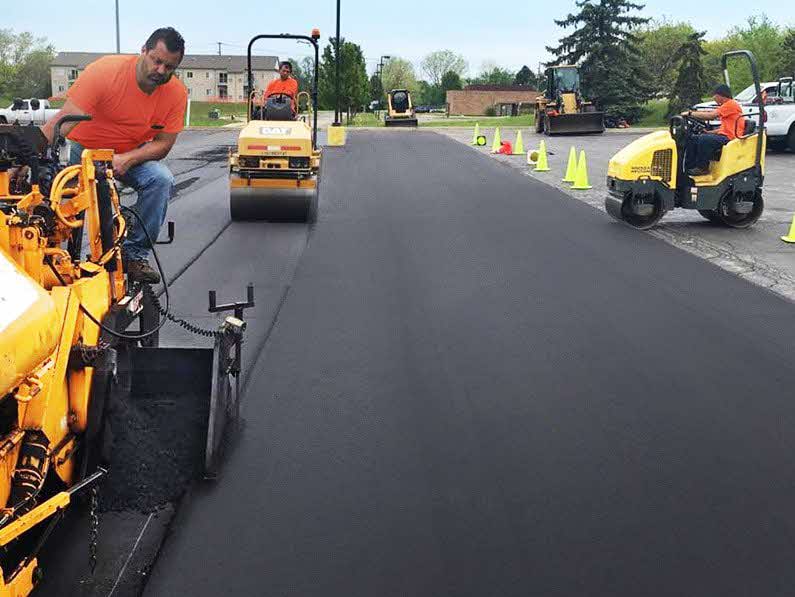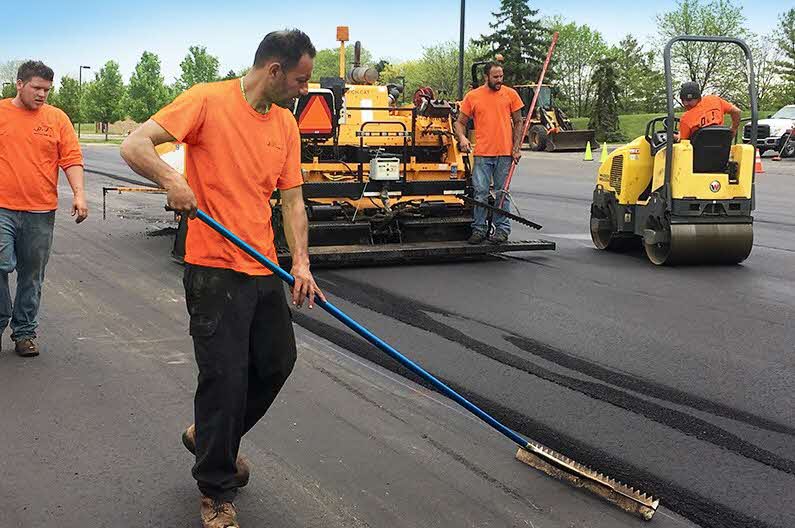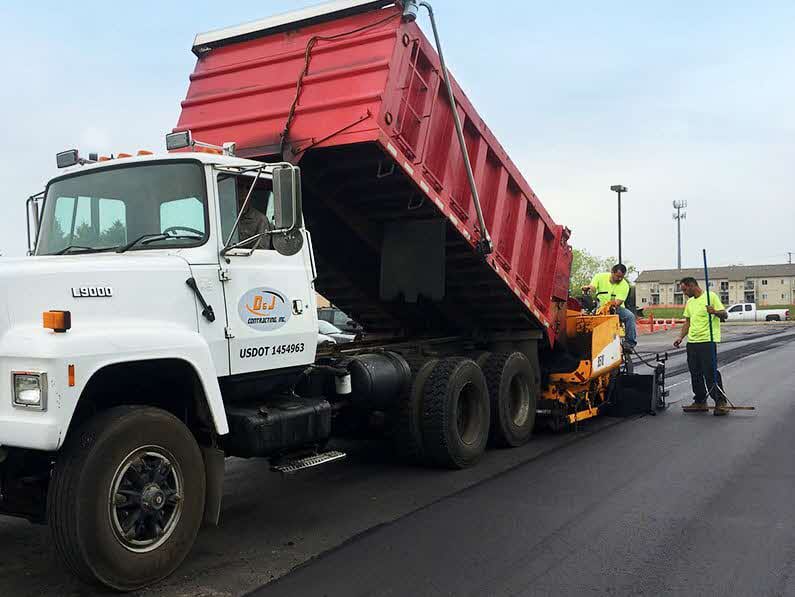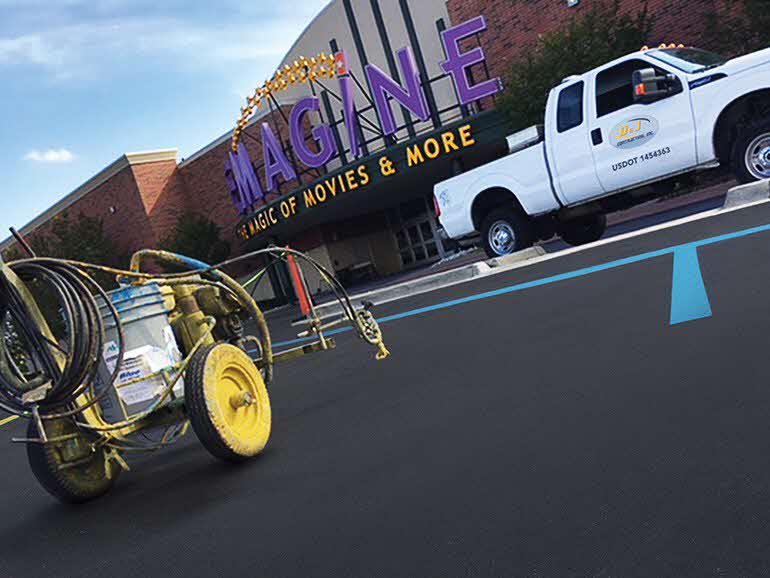Asphalt Driveways Utica Michigan
We Are Locally Owned
& Operated For 36 Years
Contact Us Today!
About Asphalt Driveways
Introduction to Asphalt Driveways
Why should asphalt driveways command your attention when considering commercial properties? They are more than just a path leading to your enterprise or retail store. If perfectly done, they extend an inviting message to your customers, contributing significantly to your property’s overall aesthetics. This detailed guide aims to educate you about the process and benefits of driveway asphalt paving and the reasons why this should be your top choice for your commercial premises.
Understanding Asphalt Driveways
Asphalt driveways, primarily made from a mixture of sand, rock, and asphalt cement, are popular among commercial properties due to their durability, cost-effectiveness and simplicity in maintenance. These characteristics help business owners avoid unnecessary costs that can strain their operating budget. The right driveway experts in asphalt paving can advise you on the specific needs of your property, ensuring it strikes the right balance between practicality and aesthetics.
Reasons to Choose Asphalt Driveways
When evaluating the cost of driveway asphalt paving, the initial investment is relatively minimal compared to other materials like concrete. The long-term savings from low maintenance costs and durability over time also play a crucial role in this affordability.
Asphalt driveways can withstand harsh weather and heavy traffic, making them an excellent option for areas with severe climates or high-traffic commercial properties. They also boast quick installation and curing times, meaning less disruption to your business operations.
Asphalt Paving Process
Before you search for ‘driveway asphalt paving near me’ or ‘asphalt paving driveway near me,’ it’s essential to get a feel for what the process entails. Constructing an asphalt driveway involves several steps. Initially, the site is prepared by removing the existing driveway or clearing the proposed space. This is followed by grading the area for proper drainage and then installing, compacting and smoothing the sub-base. Following this, a layer of binder is applied to bind the asphalt layers to the sub-base. The final step is laying and compacting the asphalt, followed by a curing period before the driveway is ready to use.
Finding the Right Asphalt Paving Professionals
When searching for ‘driveway asphalt paving companies near me,’ you should focus on professionals who can provide quality workmanship, using the right materials and following industry standards. Companies with a proven track record in asphalt paving will ensure your investment is well placed, resulting in a driveway that serves your commercial property for many years to come.
Influencing Factors of Asphalt Driveway Costs
The cost of driveway asphalt paving can depend on several factors. These include the size and shape of the driveway, the thickness of the asphalt required, any necessary site preparation or grading, and the pricing of labor and materials in your local area. While it is important to consider all these factors, it is worth noting that a well-constructed asphalt driveway will offer substantial savings over its lifespan due to its durability and reduced maintenance needs.
Conclusion – The Long Lasting Benefit of Asphalt Driveways
By working with driveway experts in asphalt paving, you can ensure that your property conveys the quality and professionalism that aligns with your business standards. Through its elegance, durability, and cost-effectiveness, an asphalt driveway is undoubtedly a worthwhile investment for your commercial property.
Are you ready to embark on an asphalt driveway project? By simply searching for ‘asphalt paving driveway near me,’ you can begin to explore the many benefits to your commercial property. We encourage you to make the leap and upgrade your commercial property with a beautifully constructed asphalt driveway.
Make that Call Today!
Whether you are setting up a new property or looking to upgrade your commercial premises, consult professionals to craft a long-lasting, appealing, and practical solution to your driveway needs. Reach out today to begin experiencing the many benefits of an asphalt driveway at your commercial property.
Contact Us Today for a FREE
Asphalt Driveway Quote






About Utica, Michigan
History
The city now known as Utica was platted by Joseph Stead in 1829, who named it “Harlow”. Others referred to the community as “Hog’s Hollow” or “McDougalville”, until a few years later it was named “Utica” by settlers from New York, in honor of the city of the same name in that state. This was common of settlers in this region, and is reflected in the names of nearby cities such as Rochester, Troy, and Livonia that are also named for New York cities.
By the 1940s, Utica was the center of a region of dairy farms and truck gardens. It had a flour mill and shipped rhubarb. Dodge Park a few miles south on the Clinton River was a state park.
As the 1950s progressed, Detroit auto companies began to build factories in neighboring Sterling and Shelby Townships, and the surrounding area began a transformation to an industrial economy.
Utica boasts a small historic district centered on Cass Avenue and Auburn Road, but few of the buildings predate 1906, due to destructive fires in 1905 and 1906.
Geography
Utica is in western Macomb County, bordered to the south by the city of Sterling Heights and to the north by Shelby Charter Township. Highways M-53 and M-59 serve the city. M-53 crosses the east side of the city, leading north 13 miles (21 km) to Romeo and south 8 miles (13 km) to Warren, while M-59 runs along the southern border of the city, leading east 8 miles (13 km) to Interstate 94 and west 15 miles (24 km) to Pontiac. Downtown Detroit is 21 miles (34 km) to the south.
According to the U.S. Census Bureau, Utica has a total area of 1.78 square miles (4.61 km), of which 0.02 square miles (0.05 km2) are water. The Clinton River passes through the center of the city, flowing southeast and then east to Lake St. Clair.
Demographics
| Census | Pop. | Note | %± |
|---|---|---|---|
| 1880 | 493 | — | |
| 1890 | 563 | 14.2% | |
| 1900 | 562 | −0.2% | |
| 1910 | 496 | −11.7% | |
| 1920 | 588 | 18.5% | |
| 1930 | 873 | 48.5% | |
| 1940 | 1,022 | 17.1% | |
| 1950 | 1,196 | 17.0% | |
| 1960 | 1,454 | 21.6% | |
| 1970 | 3,504 | 141.0% | |
| 1980 | 5,282 | 50.7% | |
| 1990 | 5,081 | −3.8% | |
| 2000 | 4,577 | −9.9% | |
| 2010 | 4,757 | 3.9% | |
| 2020 | 5,245 | 10.3% | |
| U.S. Decennial Census | |||
2010 census
As of the census of 2010, there were 4,757 people, 2,218 households, and 1,245 families living in the city. The population density was 2,781.9 inhabitants per square mile (1,074.1/km2). There were 2,463 housing units at an average density of 1,440.4 per square mile (556.1/km). The racial makeup of the city was 90.4% White, 1.9% African American, 0.5% Native American, 3.5% Asian, 1.9% from other races, and 1.8% from two or more races. Hispanic or Latino of any race were 3.8% of the population.
There were 2,218 households, of which 23.6% had children under the age of 18 living with them, 37.8% were married couples living together, 14.0% had a female householder with no husband present, 4.3% had a male householder with no wife present, and 43.9% were non-families. 38.0% of all households were made up of individuals, and 15.9% had someone living alone who was 65 years of age or older. The average household size was 2.13 and the average family size was 2.80.
The median age in the city was 41.7 years. 17.9% of residents were under the age of 18; 8.8% were between the ages of 18 and 24; 27.4% were from 25 to 44; 28.3% were from 45 to 64; and 17.4% were 65 years of age or older. The gender makeup of the city was 47.4% male and 52.6% female.
2000 census
As of the census of 2000, there were 4,577 people, 1,952 households, and 1,184 families living in the city. The population density was 2,578.2 inhabitants per square mile (995.4/km2). There were 2,005 housing units at an average density of 1,129.4 per square mile (436.1/km). The racial makeup of the city was 93.77% White, 0.92% African American, 0.37% Native American, 2.56% Asian, 0.74% from other races, and 1.64% from two or more races. Hispanic or Latino of any race were 2.10% of the population.
There were 1,952 households, out of which 27.2% had children under the age of 18 living with them, 43.8% were married couples living together, 13.3% had a female householder with no husband present, and 39.3% were non-families. 34.2% of all households were made up of individuals, and 10.8% had someone living alone who was 65 years of age or older. The average household size was 2.29 and the average family size was 2.96.
In the city, the population dispersal was 21.0% under the age of 18, 9.6% from 18 to 24, 31.7% from 25 to 44, 23.2% from 45 to 64, and 14.5% who were 65 years of age or older. The median age was 37 years. For every 100 females, there were 92.9 males. For every 100 females age 18 and over, there were 91.8 males.
The median income for a household in the city was $38,683, and the median income for a family was $57,156. Males had a median income of $36,912 versus $26,353 for females. The per capita income for the city was $21,615. About 4.8% of families and 7.0% of the population were below the poverty line, including 6.7% of those under age 18 and 17.3% of those age 65 or over.
Education
Utica Community Schools operates public schools, including Utica High School, Eppler Junior High School Flickinger Elementary School, and Wiley Elementary School. They serve the communities of Sterling Heights, Utica, and Shelby Township.
Contact Us Today for a FREE
Asphalt Driveway Quote
Our Asphalt Driveway services are available in Utica as well as all of Macomb County.
Our dedicated team at D&J Contracting Inc is at-the-ready to provide you with great customer service and first class Asphalt Driveway services. Reach out to us at (586) 954-0008 to discuss your Asphalt Driveway needs today!